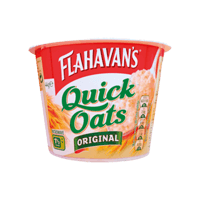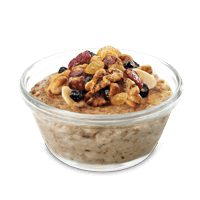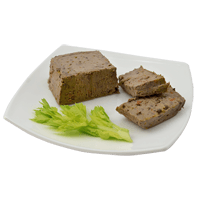Cereal nutrition: calories, carbs, GI, protein, fiber, fats
Cereals ready-to-eat, USDA Commodity Corn and Rice (includes all commodity brands)
*all the values are displayed for the amount of 100 grams
Top nutrition facts for Cereal
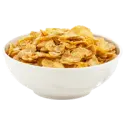
| Calories ⓘ Calories for selected serving | 378 kcal |
|
Glycemic index ⓘ
Source:
Depending on the brand the GI value can be really different
Check out our Glycemic index chart page for the full list.
|
69 (medium) |
| Glycemic load | 17 (medium) |
| Insulin index ⓘ https://ses.library.usyd.edu.au/handle/2123/11945 – II depends on the type of cereal and ranges from 23 up to 110; II for all-bran cereal is 23 | 23 |
| Net Carbs ⓘ Net Carbs = Total Carbohydrates – Fiber – Sugar Alcohols | 85 grams |
| Default serving size ⓘ Serving sizes are mostly taken from FDA's Reference Amounts Customarily Consumed (RACCs) | 1 cup (29 grams) |
| Acidity (Based on PRAL) ⓘ PRAL (Potential renal acid load) is calculated using a formula. On the PRAL scale the higher the positive value, the more is the acidifying effect on the body. The lower the negative value, the higher the alkalinity of the food. 0 is neutral. | 3 (acidic) |
| Oxalates ⓘ https://pubmed.ncbi.nlm.nih.gov/16608223 | 48 mg |
Net carbs ⓘHigher in Net carbs content than 99% of foods
Carbs ⓘHigher in Carbs content than 99% of foods
Iron ⓘHigher in Iron content than 98% of foods
Vitamin B1 ⓘHigher in Vitamin B1 content than 93% of foods
Vitamin B2 ⓘHigher in Vitamin B2 content than 93% of foods
Cereal calories (kcal)
| Calories for different serving sizes of cereal | Calories | Weight |
|---|---|---|
| Calories in 100 grams | 378 | |
| Calories in 1 cup | 110 | 29 g |
| Calories for different varieties of cereal | Calories | Weight |
|---|---|---|
| Cereals ready-to-eat, USDA Commodity Corn and Rice (includes all commodity brands) (this food) | 378 | 100 g |
| Cereals ready-to-eat, WEETABIX whole grain cereal | 371 | 100 g |
| Cereals ready-to-eat, wheat and bran, presweetened with nuts and fruits | 385 | 100 g |
Cereal Glycemic index (GI)
Source:
Depending on the brand the GI value can be really different
Check out our Glycemic index chart page for the full list.
Cereal Glycemic load (GL)
Mineral coverage chart
Mineral chart - relative view
Vitamin coverage chart
Vitamin A:
2442µg of 900µg
271%
Vitamin E:
0.24mg of 15mg
1.6%
Vitamin D:
0µg of 20µg
0%
Vitamin C:
116mg of 90mg
128%
Vitamin B1:
19mg of 1mg
1572%
Vitamin B2:
12mg of 1mg
893%
Vitamin B3:
89mg of 16mg
555%
Vitamin B5:
0.68mg of 5mg
14%
Vitamin B6:
18mg of 1mg
1381%
Folate:
0µg of 400µg
0%
Vitamin B12:
0µg of 2µg
0%
Vitamin K:
0µg of 120µg
0%
Vitamin chart - relative view
Macronutrients chart
Protein:
Daily Value: 12%
6.1 g of 50 g
6.1 g (12% of DV )
Fats:
Daily Value: 2%
1.1 g of 65 g
1.1 g (2% of DV )
Carbs:
Daily Value: 29%
86.9 g of 300 g
86.9 g (29% of DV )
Water:
Daily Value: 0%
3.8 g of 2,000 g
3.8 g (0% of DV )
Other:
2.2 g
2.2 g
Protein quality breakdown
Tryptophan:
198mg of 280mg
71%
Threonine:
723mg of 1,050mg
69%
Isoleucine:
780mg of 1,400mg
56%
Leucine:
2301mg of 2,730mg
84%
Lysine:
339mg of 2,100mg
16%
Methionine:
390mg of 1,050mg
37%
Phenylalanine:
1095mg of 1,750mg
63%
Valine:
1032mg of 1,820mg
57%
Histidine:
486mg of 700mg
69%
Fat type information
Saturated fat:
0.26 g
Monounsaturated fat:
0.2 g
Polyunsaturated fat:
0.35 g
Carbohydrate type breakdown
Starch:
0 g
Sucrose:
9.7 g
Glucose:
0.27 g
Fructose:
0.26 g
Lactose:
0 g
Maltose:
0.09 g
Galactose:
0 g
Fiber content ratio for Cereal
Sugar:
10 g
Fiber:
1.4 g
Other:
75 g
All nutrients for Cereal per 100g
| Nutrient | Value | DV% | In TOP % of foods | Comparison |
| Vitamin A | 814µg | 90% | 19% | |
| Calories | 378kcal | 19% | 18% |
8 times more than Orange
|
| Protein | 6.1g | 14% | 57% |
2.1 times more than Broccoli
|
| Fats | 1.1g | 2% | 74% |
30.8 times less than Cheese
|
| Vitamin C | 39mg | 43% | 14% |
1.4 times less than Lemon
|
| Net carbs | 85g | N/A | 1% |
1.6 times more than Chocolate
|
| Carbs | 87g | 29% | 1% |
3.1 times more than Rice
|
| Magnesium | 19mg | 5% | 64% |
7.4 times less than Almonds
|
| Calcium | 10mg | 1% | 76% |
12.5 times less than Milk
|
| Potassium | 105mg | 3% | 81% |
1.4 times less than Cucumber
|
| Iron | 34mg | 426% | 2% |
13.1 times more than Beef broiled
|
| Sugar | 10g | N/A | 39% |
1.2 times more than Coca-Cola
|
| Fiber | 1.4g | 6% | 44% |
1.7 times less than Orange
|
| Copper | 0.14mg | 15% | 40% |
Equal to Shiitake
|
| Zinc | 7.6mg | 69% | 12% |
1.2 times more than Beef broiled
|
| Phosphorus | 77mg | 11% | 70% |
2.4 times less than Chicken meat
|
| Sodium | 795mg | 35% | 9% |
1.6 times more than White bread
|
| Vitamin E | 0.08mg | 1% | 88% |
18.3 times less than Kiwi
|
| Manganese | 0.79mg | 34% | 34% | |
| Selenium | 6.3µg | 11% | 65% | |
| Vitamin B1 | 6.3mg | 524% | 7% |
23.6 times more than Pea raw
|
| Vitamin B2 | 3.9mg | 298% | 7% |
29.8 times more than Avocado
|
| Vitamin B3 | 30mg | 185% | 8% |
3.1 times more than Turkey meat
|
| Vitamin B5 | 0.23mg | 5% | 79% |
5 times less than Sunflower seeds
|
| Vitamin B6 | 6mg | 460% | 10% |
50.3 times more than Oats
|
| Vitamin K | 0µg | 0% | 100% |
N/A
|
| Saturated fat | 0.26g | 1% | 75% |
22.7 times less than Beef broiled
|
| Monounsaturated fat | 0.2g | N/A | 78% |
48 times less than Avocado
|
| Polyunsaturated fat | 0.35g | N/A | 69% |
133.3 times less than Walnut
|
| Tryptophan | 0.07mg | 0% | 83% |
4.6 times less than Chicken meat
|
| Threonine | 0.24mg | 0% | 81% |
3 times less than Beef broiled
|
| Isoleucine | 0.26mg | 0% | 82% |
3.5 times less than Salmon raw
|
| Leucine | 0.77mg | 0% | 76% |
3.2 times less than Tuna Bluefin
|
| Lysine | 0.11mg | 0% | 90% |
4 times less than Tofu
|
| Methionine | 0.13mg | 0% | 81% |
1.4 times more than Quinoa
|
| Phenylalanine | 0.37mg | 0% | 80% |
1.8 times less than Egg
|
| Valine | 0.34mg | 0% | 81% |
5.9 times less than Soybean raw
|
| Histidine | 0.16mg | 0% | 82% |
4.6 times less than Turkey meat
|
| Fructose | 0.26g | 0% | 90% |
22.7 times less than Apple
|
| Omega-3 - EPA | 0g | N/A | 100% |
N/A
|
| Omega-3 - DHA | 0g | N/A | 100% |
N/A
|
| Omega-3 - DPA | 0g | N/A | 100% |
N/A
|
| Omega-6 - Eicosadienoic acid | 0g | N/A | 100% |
Check out similar food or compare with current
NUTRITION FACTS LABEL
Nutrition Facts
___servings per container
Serving Size ______________
Serving Size ______________
Amount Per 100g
Calories 378
% Daily Value*
1.7%
Total Fat
1.1g
1.2%
Saturated Fat 0.26g
0
Trans Fat
0g
0
Cholesterol 0mg
35%
Sodium 795mg
29%
Total Carbohydrate
87g
5.6%
Dietary Fiber
1.4g
Total Sugars 0g
Includes ? g Added Sugars
Protein
6.1g
Vitamin D
0mcg
0
Calcium
10mg
1%
Iron
34mg
426%
Potassium
105mg
3.1%
*
The % Daily Value (DV) tells you how much a nutrient in a serving of food contributes to a daily diet. 2,000 calories a day is used for general nutrition advice.
Health checks
ⓘ
Dietary cholesterol is not associated with an increased risk of coronary heart disease in healthy individuals. However, dietary cholesterol is common in foods that are high in harmful saturated fats.
Source
Low in Cholesterol
ⓘ
Trans fat consumption increases the risk of cardiovascular disease and mortality by negatively affecting blood lipid levels.
Source
No Trans Fats
ⓘ
Saturated fat intake can raise total cholesterol and LDL (low-density lipoprotein) levels, leading to an increased risk of atherosclerosis. Dietary guidelines recommend limiting saturated fats to under 10% of calories a day.
Source
Low in Saturated Fats
ⓘ
While the consumption of moderate amounts of added sugars is not detrimental to health, an excessive intake can increase the risk of obesity, and therefore, diabetes.
Source
Low in Sugars
Cereal nutrition infographic
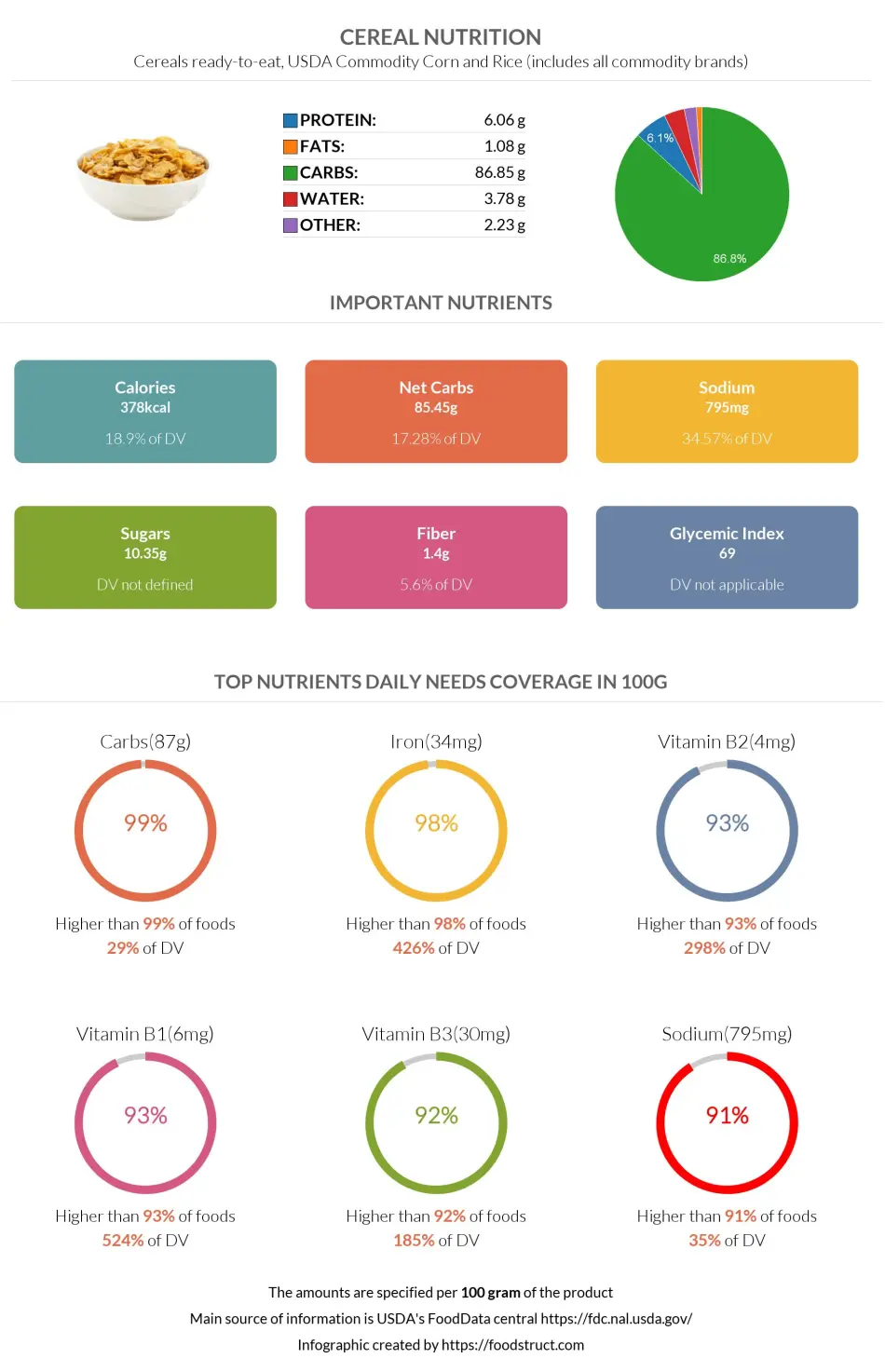
Infographic link
